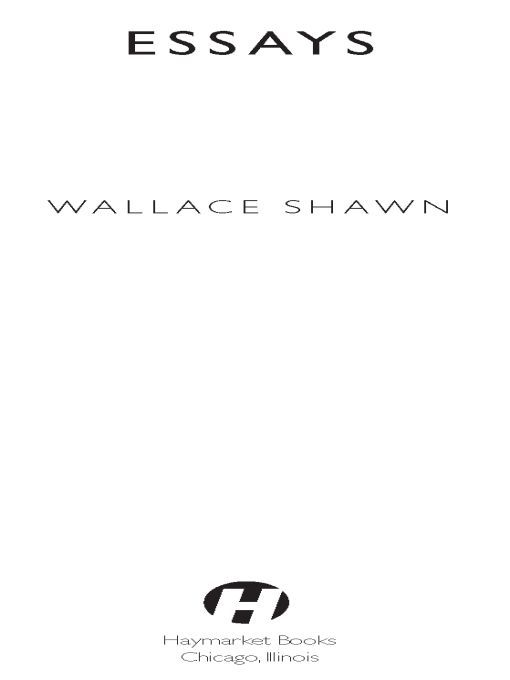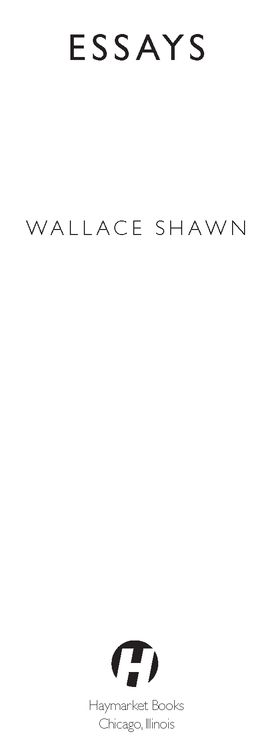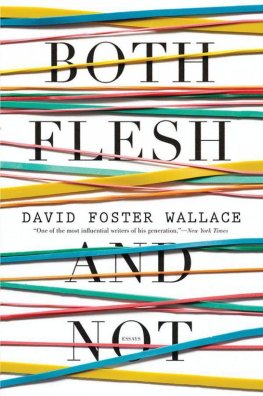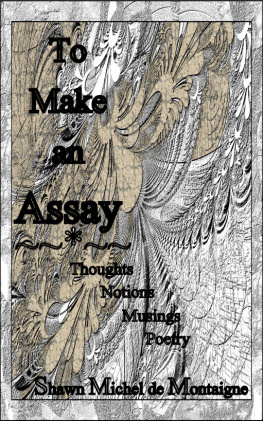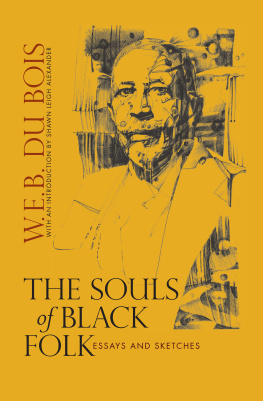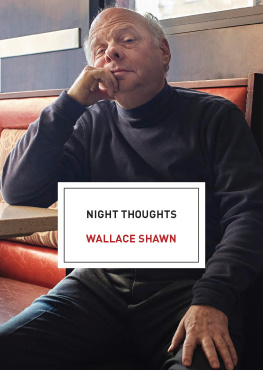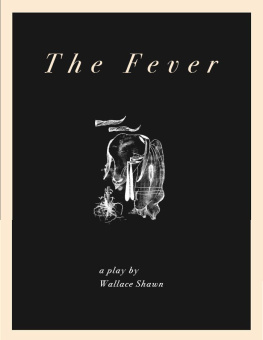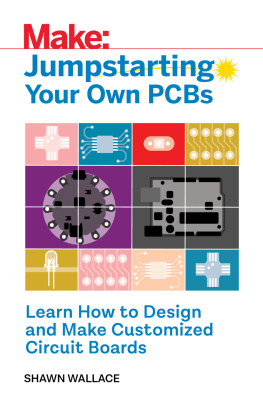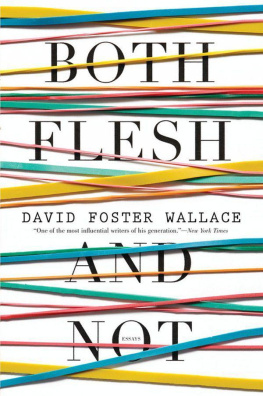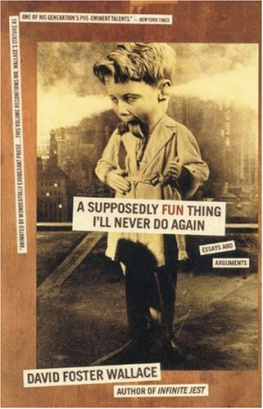Table of Contents
to Jonathan Schell and Deborah Eisenberg in meditation (J.S.) and in fiction (D.E.): reality, truth, accepting it all; but thenintense, passionate dreams about extraordinary cities, a world where people live in harmony
1951talks on the state of the world begin with J.S. after eighth birthday party
1972meet D.E.shocked by her viewsdiscussion of China leads to tears
INTRODUCTION
The human community is carved up into individuals. Why? Presumably because its helped us to survive, because a sleeping dog can easily be kicked, but its hard to damage a large group of flies. I honestly dont know. At any rate, I didnt ask to be an individual, but I find I am one, and by definition I occupy a space that no other individual occupies, or in other words, for what its worth, I have my own point of view. Im not proud to be me, Im not excited to be me, but I find that I am me, and like most other individuals, I send out little signals, I tell everyone else how everything looks from where I am. I have more free time than a lot of individuals, so, instead of talking, I sometimes write. My friends Anthony and Brenda found my signals interesting, so Anthony asked me to collect them into a book.
Ive always somewhat hated being me and only me. I wrote my first play at the age of ten, fifty-five years ago, and Ive always found it a fantastic relief to imagine I know what things would be like from the point of view of other individuals and to send out signals from where I actually am not. Playwrights never need to write from the place where they are. Unlike the fiction writer who says, as himself, Fred woke up in his bed that cloudy Sunday, a playwright can spend a lifetime writing without ever speaking from his own location.
Ive passed my life largely in a fantasy world. My personal life is lived as me, but my professional life is lived as other people. In other words, when I go to the office, I lie down, dream, and become someone else. Thats my job.
Ive worked in the theatre since 1970. Ive written plays and a few screenplays, in each one of which a person who isnt me speaks, and then another person who isnt me replies, and then a third one enters or the first one speaks again, and so it goes until the end of the piece. Ive even worked as a professional actor, speaking out loud as if I were someone not myself. And perhaps its disturbing or frightening how easy it is to become someone else, to say the words of someone else. It really doesnt feel odd at all, I have to tell you.
Every once in a while, though, I like to take a break from fantasyland, and I go off to the place called Reality for a brief vacation. Its happened a dozen or so times in the course of my life. Ive looked at the world from my own point of view, and Ive written these essays. Ive written essays about reality, the world, and Ive even written a few essays about the dream-world of art in which I normally dwell. In a bold mood Ive brooded once or twice on the question, Where do the dreams go, and what do they do, in the world of the real?
My congenital inability to take the concept of the inviolable self seriouslymy lack of certainty about who I am, where I am, and what my characteristics arehas led me to a certain skepticism, a certain detachment, when people in my vicinity are reviling the evil and alien Other, because I feel that very easily I could become that Other, and so could the reviler. And this has had an effect on my view of the world.
I grew up listening to discussions about the world, and in school I studied history and politics and even a little elementary economics. My parents were completely (some might say excessively) assimilated American Jews whose own parents (said with only a moderate degree of certainty to have been born in Sweden, England, Germany, and possibly Canada) were probably all of Eastern European or Russian origin, or in other words, saved from a harsh destiny by the existence of the United States of America. My mother and father, fortunate members of the bourgeoisie, were American liberals of the old school. They never described the United States as the greatest country in the world as many politicians did. They were passionately close to their French friends and their English friends and presided over a living room in which people from India, Poland, Italy, and Czechoslovakia were constant visitors, and they adored and admired Adlai Stevenson. From an early age, I remember going with my mother to the gorgeous, modern United Nations buildings on our own island of Manhattan and buying holiday cards from UNICEF in the United Nations gift shop. (As a Jewish atheist, my mother was one of the worlds most loyal devotees of Christmas, and she loved Advent calendars, Christmas trees, and Christmas cards.) Mother loved UNICEF, the United Nations Childrens Emergency Fund, which helped poor children all over the world, and she loved the United Nations; and, to her, being an American meant being a person who loved the United Nations and was a friend to poor children all over the world, like Eleanor Roosevelt and Adlai Stevenson.
When not totally preoccupied with my own problems, I feel some of the emotions my mother felt toward those poor children all over the world. But my earliest essay, Morality, from 1985 (I was just over forty years old when I wrote it) shows me slowly seeing, as it appeared out of the mist, the outline of my own figure as a character in their story. It turned out that my role was sinister, dreadful, but for my first forty years I hadnt realized that. My ignorance about my own involvement in the story of the children allowed me to think, Yes, the conditions in the world are terrible, certainlybut I still could feel that the topic could be discussed in a leisurely manner. When one hasnt noticed that its ones own boot thats standing on the suffering persons neck, one can be calmly sympathetic to the suffering person and hope that over time things will work out well for them.
I never became as nice as my mother. But by the time I was forty-five I understood a few things that shed overlooked. I suppose Im something like what my mother would have been if shed gone down into her basement and stumbled on Eleanor Roosevelt murdering babies there.
The schizophrenic nature of this book (essays on war and death and essays on the windowless miniature world of theatre) gives a pretty good picture of my own mind. Born by most definitions into the ruling class, I was destined to live a comfortable life. And to spend ones life as a so-called creative artist is probably the most comfortable, cozy, and privileged life that a human being can live on this earththe most bourgeois life, if one uses that phrase to describe a life that is so comfortable that no one living it would want to give it up. To lie in bed and watch words bump together until they become sentences is a form of hedonism, whether the words and sentences glorify society and the status quo or denounce them. Its very agreeable to live like that, even if people dont like your work, criticize you, whatever. So Ive always been tempted to turn off the radio and forget the world, but Im not quite enough of a hedonist to forget it entirely and forever. Im unable to totally forget the worldbut I still havent (yet) become a compassionate enough person to leave my bed for more than a moment in order to devote myself to changing the world or alleviating the suffering of my fellow human beings.

